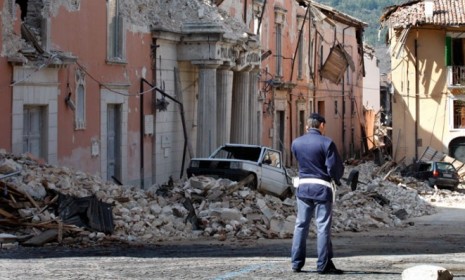The L'Aquila verdict: Is it wrong to jail scientists for flubbing earthquake warnings?
Several seismologists get six years in jail for telling the public there was nothing to worry about days before a deadly quake

A free daily email with the biggest news stories of the day – and the best features from TheWeek.com
You are now subscribed
Your newsletter sign-up was successful
An Italian court has sentenced a group of six scientists and a government official to six years in jail after finding them guilty of manslaughter because they failed to warn residents of L'Aquila, Italy, ahead of a devastating earthquake that killed 308 people in 2009. The defendants were members of a Major Risks Committee assembled to assess the potential danger of a major quake after several small tremors shook the region. The group concluded that it was impossible for them to predict whether a stronger temblor would follow, and one of the scientists famously advised locals to relax with a glass of wine — six days before the deadly quake struck. Many relatives of the dead are pleased with Monday's verdict, but members of the scientific community are aghast, arguing that nobody can predict when earthquakes will hit. Is there any justification for punishing the experts when they get it so wrong?
This is a travesty: "The L'Aquila disaster is an extraordinary tragedy," says Tom Chivers at Britain's Telegraph. Many survivors, understandably, want someone to blame. "The L'Aquila seven will have to live with what happened for the rest of their lives. But jailing scientists for making a (presumably honest) prediction to the best of their knowledge is a startlingly stupid idea."
The Week
Escape your echo chamber. Get the facts behind the news, plus analysis from multiple perspectives.

Sign up for The Week's Free Newsletters
From our morning news briefing to a weekly Good News Newsletter, get the best of The Week delivered directly to your inbox.
From our morning news briefing to a weekly Good News Newsletter, get the best of The Week delivered directly to your inbox.
Their crime was saying there was zero danger: These seismologists aren't going to jail for failing to spot the big one, says George Dvorsky at i09. They were prosecuted for "falsely reassuring" the public that there was no danger at all. The L'Aquila region is an earthquake hot zone. Prosecutor Fabio Picuti argued — successfully, it turns out — that telling people they could relax amounted to "an incomplete, inept, unsuitable, and criminally mistaken" analysis of the risks.
"Six scientists convicted of manslaughter for failing to warn citizens about an earthquake"
This could have a chilling effect: "Sadly, the issue is not 'if' but 'when' the next tremor will occur in L'Aquila," says Jonathan Amos at BBC News. Of course, scientists won't be any more able to predict the next one than they were the last one, although they can let people know the probabilities. But following this verdict, it won't be easy to get any researchers to size up the risks next time, because they'll know they could wind up behind bars if they get it wrong.
"L'Aquila quake: Italy scientists guilty of manslaughter"
A free daily email with the biggest news stories of the day – and the best features from TheWeek.com
-
 The EU’s war on fast fashion
The EU’s war on fast fashionIn the Spotlight Bloc launches investigation into Shein over sale of weapons and ‘childlike’ sex dolls, alongside efforts to tax e-commerce giants and combat textile waste
-
 How to Get to Heaven from Belfast: a ‘highly entertaining ride’
How to Get to Heaven from Belfast: a ‘highly entertaining ride’The Week Recommends Mystery-comedy from the creator of Derry Girls should be ‘your new binge-watch’
-
 The 8 best TV shows of the 1960s
The 8 best TV shows of the 1960sThe standout shows of this decade take viewers from outer space to the Wild West